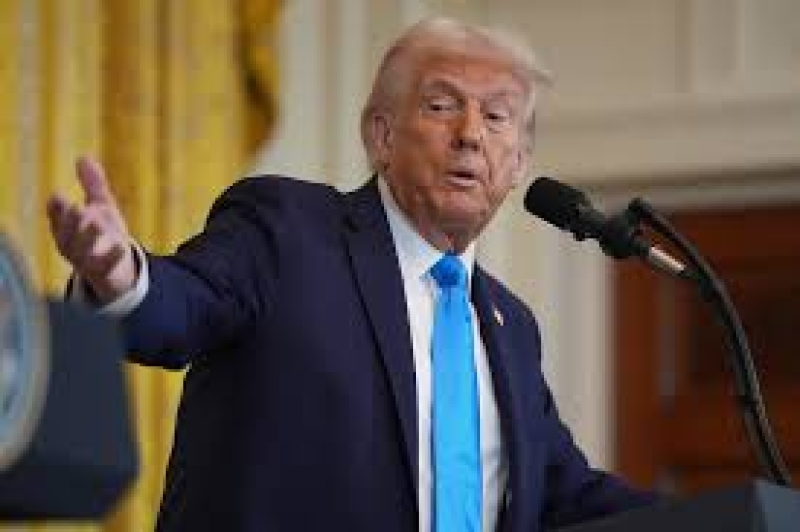- UN Warns Gaza Fuel Crisis Threatens Humanitarian Collapse |
- WHO’s Saima Wazed placed on indefinite leave amid graft probe |
- UNRWA Commissioner-Gen. on Gaza: 800 starving people killed |
- 150,000 Rohingya flee to BD amid renewed Myanmar violence |
- Scrap trader hacked, stoned dead: 2 Jubo Dal men expelled |
Global Reactions Cautious to US 'Reciprocal' Tariffs

The U.S. President Donald Trump's announcement of new tariffs, ranging from 10% to 49%, has sparked cautious reactions from global trading partners, reflecting a reluctance to escalate tensions into a full-scale trade war. The tariffs were introduced as “reciprocal” measures, aimed at matching the trade policies other countries have imposed on the U.S. for decades.
Trump justified the tariffs by claiming they would protect American workers and restore jobs, positioning the move as both an economic necessity and a matter of national security. “Taxpayers have been exploited for over 50 years,” he declared, adding, “But that stops now.”
Market Response and Economic Uncertainty
Financial markets were immediately rattled by the announcement. U.S. stock futures fell by up to 3% early Thursday, while Tokyo’s stock exchange saw significant declines. Oil prices dropped by more than $2 per barrel, and Bitcoin lost 4.4% of its value.
Global Leaders Respond
Key international players voiced their concerns, with the UK’s Business Secretary, Jonathan Reynolds, reaffirming the importance of a trade deal to offset the impact of the 10% tariffs on British exports. “Nobody wants a trade war, and we remain focused on reaching an agreement,” Reynolds stated, emphasizing the UK's commitment to protecting its national interests.
Italian Prime Minister Giorgia Meloni criticized the 20% tariffs imposed on the EU, calling them “misguided” and warning that a trade conflict would benefit other global powers rather than the U.S. “We will do everything possible to reach an agreement,” she stated, stressing the potential damage to both sides.
Brazil, meanwhile, signaled its intention to challenge the tariffs at the World Trade Organization, with Congress passing a law that would allow for reciprocal tariffs on any nation targeting Brazilian exports.
Doubts Over Justification
Several nations expressed doubt over the rationale behind the tariffs. Australian Prime Minister Anthony Albanese dismissed the tariffs on his country as unjustified, noting Australia’s trade surplus with the U.S. “A true reciprocal tariff would be zero, not 10%,” he said, pointing to the two nations' free trade agreement.
Officials on Norfolk Island, a small Australian territory, were baffled by a 29% tariff, given that the island does not export goods to the U.S. "To my knowledge, we don’t export anything to the U.S.," said Administrator George Plant.
New Zealand’s Trade Minister, Todd McClay, also questioned the logic behind the U.S. tariffs, stressing that New Zealand has a low tariff regime. "We won’t retaliate because that would only increase costs for our own consumers," he said.
North American Exemptions and Responses
Mexico and Canada were initially exempt from the tariffs, thanks to their trade deals with the U.S. However, the previously announced 25% tariffs on auto imports were set to take effect. Mexican President Claudia Sheinbaum indicated that she would assess the impact before taking further action, emphasizing that her country’s priority was strengthening the economy, not escalating tensions.
Canada, which had already imposed retaliatory tariffs over previous U.S. trade measures, is likely to respond to this latest round. Meanwhile, the European Union imposed tariffs on $28 billion worth of U.S. goods, prompting Trump to threaten a 200% tariff on European alcohol.
The Risks of Escalation
While defending the tariffs, Trump reiterated that the U.S. could no longer afford a strategy of economic concessions, especially in the face of “relentless economic competition.” In contrast, Chilean President Gabriel Boric warned that such tariffs could undermine international trade agreements and create further economic uncertainty.
Colombian President Gustavo Petro declared that the U.S. move marked the end of neoliberal free trade policies, a sentiment echoed by experts who caution against a full-scale trade war.
Matteo Villa, a senior analyst at Italy’s Institute for International Political Studies, noted that a trade war would benefit no one. “Trump has put Europe in a difficult position once again,” he said. “If the EU retaliates, it could hurt both Europe and the U.S., but Europe may suffer more due to its reliance on American trade.”
Villa suggested that a strong European response might be necessary to push Trump toward negotiations. “Trump only seems to understand strength,” he said. “The hope in Brussels is that firm action will force him to reconsider and eventually reverse course.”

